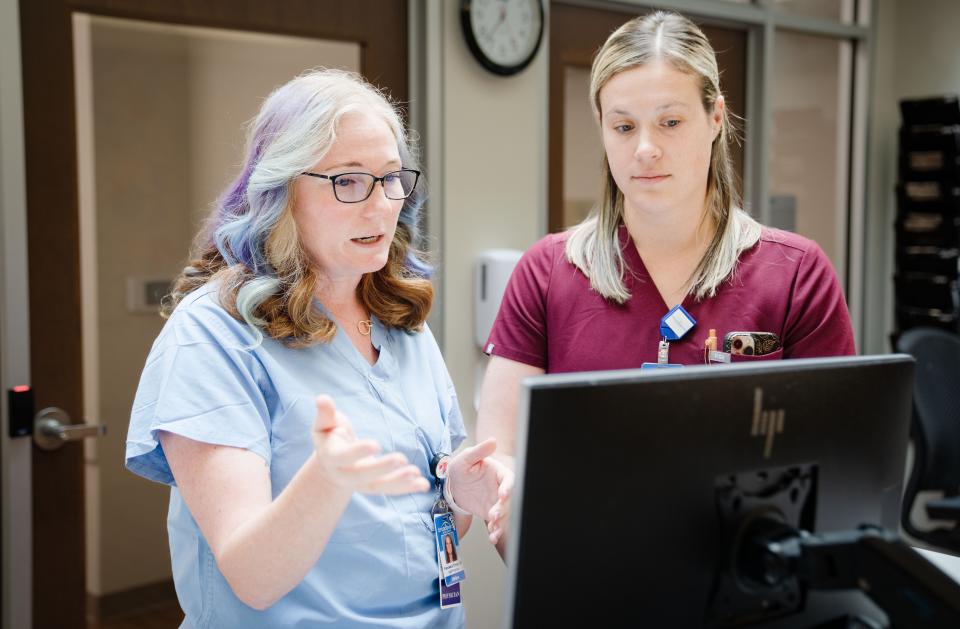Iowa has a shortage of OB-GYN doctors. The new abortion ban could make that worse.
Iowa's ability to produce obstetricians and gynecologists, along with its ability to recruit prospective providers to practice in the state, would be in jeopardy if the new six-week abortion ban goes into effect, health experts say.
The stricter law creates new roadblocks for Iowa's sole obstetrics and gynecology residency program to train aspiring doctors, which in turn could make it harder for the program to recruit trainees.
Health experts warn that would create a domino effect that could jeopardize the state's ability to retain OB-GYNs to provide reproductive health care to Iowans, an alarming possibility in a state that already has gaps in maternal health access.
“We may lose some very qualified applicants that could potentially provide these services that we’re in dire need of in Iowa," said Dr. Amy Bingaman, an OB-GYN at Broadlawns Medical Center in Des Moines.

The new "fetal heartbeat" law that Republican Gov. Kim Reynolds signed into law last month would prohibit nearly all abortions after doctors detect cardiac activity in an embryo, which typically occurs about six weeks into a pregnancy. The law allows for exceptions for rape, incest, fatal fetal abnormalities and in cases of medical emergencies.
A district court judge temporarily blocked its enforcement, but that stay may be temporary. The Iowa Supreme Court has agreed to take up Reynolds' appeal of the injunction and will decide the issue in the coming term, which begins Sept. 1.
Health providers say that even if the new law does not immediately go into effect, it signals to prospective medical students and residents that Iowa is an unfriendly state to reproductive health care access.
As a result, doctors say Iowa may see fewer trainees seek out its medical schools and residency programs, especially if they hope to pursue a career as an OB-GYN.
“In my role, I get a lot of questions about what's happening in the state," said Dr. Rebecca Shaw, an OB-GYN and associate professor at Des Moines University's medical school. "'What is the environment in the state of Iowa? Given the legislative climate, what kind of a state would I be practicing in if I choose to come to Iowa to practice medicine?' But more urgently to my students is, ‘What kind of state would I be receiving my post-graduate training in?’ And what students see is (Iowa) is unfriendly to reproductive choice.”
How does this law affect Iowa's OB-GYN residency program?
Iowa's sole OB-GYN residency program is at the University of Iowa Hospitals and Clinics.
To maintain accreditation, the Accreditation Council on Graduate Medical Education requires OB-GYN programs in the U.S. to provide clinical training or access to clinical training in abortions. Residents can choose to opt out of that training.
Doctors say training in abortion care is critical for OB-GYNs to provide a full scope of care to patients, including those who may be miscarrying or otherwise experiencing an emergency that necessitates the procedure.
If a residency program is in a state that legally restricts that clinical experience, accreditors say the program "must provide access to this clinical experience in a jurisdiction where no such legal restriction is present." That means Iowa residents will likely have to travel out of state for the multiweek training.
The Iowa City-based system has not commented on the implications from the state's new abortion restrictions and so far has been tight-lipped on the work officials are doing behind the scenes to ensure the residency program retains accreditation.
The Iowa Board of Regents, which oversees the state's higher education institutions, said in a statement that the university is working with accreditors to provide the education needed for its trainees.
"As the only obstetrics and gynecology residency program in Iowa, University of Iowa Health Care is committed to continuing this vital training program," said Josh Lehman, Board of Regents spokesperson. "Training more doctors and health care professionals for Iowa in OB-GYN is critical to meeting the needs of our state."
UI and Board of Regents officials declined to provide further insight on the effort to retain the program's accredited status.
This isn't the first time the program has had to grapple with the implications of a six-week abortion ban. In 2018, the Iowa Legislature passed an abortion ban that was nearly identical to the one signed into law by Reynolds last month.
UI officials overseeing the OB-GYN residency program said at the time that they would likely form partnerships with an out-of-state clinic to continue offering this training. Officials also considered establishing their own clinic in another state without restrictions.
While physicians outside the university are confident the program will still exist if the ban goes into effect, they say it could have serious implications for the program and other medical training programs in the state.
“When you put restrictions on the residency program, it might be more difficult to even have residents in our state," said Dr. Francesca Turner, an OB-GYN at Broadlawns.

As medical residents avoid red states, Iowa grapples with maternal care shortages
States that have enacted strict abortion bans saw a 10.5% drop in applicants for OB-GYN residency programs in 2023 compared with the previous year, according to data from the Association of American Medical Colleges.
While overall applicants to OB-GYN programs nationwide were down this year, researchers said the sharp decline in those states indicated that prospective residents were avoiding areas with restrictions.
Iowa did not have an abortion ban during last year's application cycle. The next batch of applicants for next year's cohort is due later this fall, so it's unclear yet how Iowa's new ban will affect interest in the program.
Health experts say residents who train in programs in Iowa are more likely to stay in the state to provide care.
“I don't think any OB-GYN wants that government mandate on their ability to take care of their patients," Bingaman said. "If I didn’t have any attachment to Iowa, I would much prefer to practice in the state in which I don't worry about any government sanctions or liability in providing the appropriate care for my patients.”
Iowa already has a critical need for maternal health care.
Data from state public health officials indicates Iowa has 3.3 OB-GYN providers for every 10,000 women of reproductive age in the state — the lowest number of providers per capita in the country. In 2021, Iowa had 231 providers to care for more than 606,000 women of reproductive age.
That shortage is also tied to a declining number of birthing centers across the state. Since 2000, 41 labor and delivery units across the state have permanently shut down — mostly in rural parts of Iowa. Only about 40% of Iowa counties have a birthing center, experts estimate.
Now, a third of Iowa counties are maternity care deserts, meaning they don't have an OB-GYN or a birthing center, according to a new report from March of Dimes. In some cases, women in those counties have to travel nearly 40 miles to reach the nearest birthing hospital.
In addition, more than 41% of Iowa women live in counties where they face a very high or high vulnerability to adverse outcomes because they lack access to care.
Medical students say ban reduces likelihood they'll apply for residency programs in Iowa
Health experts say the abortion ban's implications can also have ripple effects on other medical training programs, such as the obstetrics fellowship at Broadlawns.
The program offers family medicine doctors an additional year of training in obstetrics care, which includes instruction on providing C-sections and managing miscarriages.
The goal of the fellowship is to equip doctors to provide care in rural, underserved areas of the state, and aims to serve as a stopgap to address the OB-GYN shortage in those areas, Turner said.
However, it's still unclear when doctors would be allowed to intervene under the new ban's exceptions for cases of medical emergencies or fatal anomalies. Some doctors say they worry that doctors will have to wait until a patient's condition worsens before they're allowed under the law to provide an abortion.
Turner said she worries doctors practicing in rural areas — where they are often the only provider for miles with the skills to address pregnancy complications — will lack the support they need to handle the challenging cases that could result from this ban. That could result in more physician burnout.
“If you are unable to provide the care that patients deserve, and you have a bad outcome, that will affect your mental health and that will affect your ability to continue doing that," Turner said. "You'll be more likely to stop doing obstetrics if you don't have that support.”
Though their practice may not necessarily be affected by an abortion ban, other residents say the law has serious implications for physician-patient relationships.
A native of Iowa, Emily Trudeau is in her second year in UI's family medicine-psychiatry residency program. In her field, building relationships with patients is critical, but she said laws like the six-week abortion ban create more distrust in the medical system.
“Having legal interference within our relationship between the physician and the patient is really disruptive because it creates this disconnect and this confusion where we want to do things for the patient, but we're not able to because of laws that aren't evidence-based," she said.
Shaw said Iowa's new abortion ban shouldn't affect the education medical students receive. Instruction on abortion care would still be included in the didactic curriculum, and medical students aren't required to observe abortions as part of their clinical experience.
While students can seek out additional clinical experience in elective abortions on their own, the ban could make it challenging for individuals to find those opportunities.
Because of this, some medical trainees in Iowa say they're rethinking their long-term commitment to Iowa.
For some, like Kaitlyn Hanson, a first-year medical student at DMU who plans to pursue a career as an OB-GYN, the choice to seek out training elsewhere is easy. She said abortion training is a critical piece of that field, and she wants a comprehensive program that can teach her those skills.
"It's something I want to be folded into my residency training, so I am absolutely put off from applying to programs from states with restrictive abortion laws," Hanson said.
For others, the new law has made that decision murky. Alina Beltrami, a third-year medical student at DMU, is still deciding on a residency track. She said depending on what field she ultimately pursues, the new law would likely be a factor in that decision.
“If this ban hadn't passed, I think I would be more willing to say I will for sure be applying to residency here,” she said.
Trudeau hopes to receive training to provide prenatal and postpartum care to her patients, as well as abortion care. At the moment, she said she hopes to practice in Iowa in order to be an advocate for her future patients. However, she’s not sure whether that drive will last.
“Today, I'm feeling I would want to stay and I would want to try to help people, but I wouldn't say that's for certain at all,” Trudeau said. “I could change my mind and decide Minnesota is a better place to be or maybe Michigan's a better place to be. It’s not far away, and my family wouldn’t be far away, so it’s an option.”
Michaela Ramm covers health care for the Des Moines Register. She can be reached at mramm@registermedia.com, at (319) 339-7354 or on Twitter at @Michaela_Ramm.
This article originally appeared on Des Moines Register: Iowa's new abortion ban could reduce applicants for OB-GYN training

